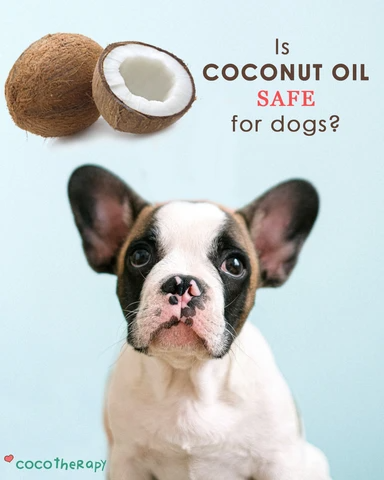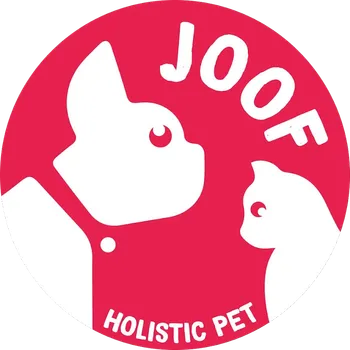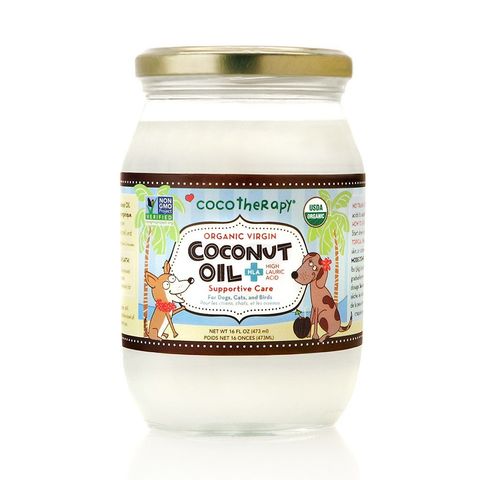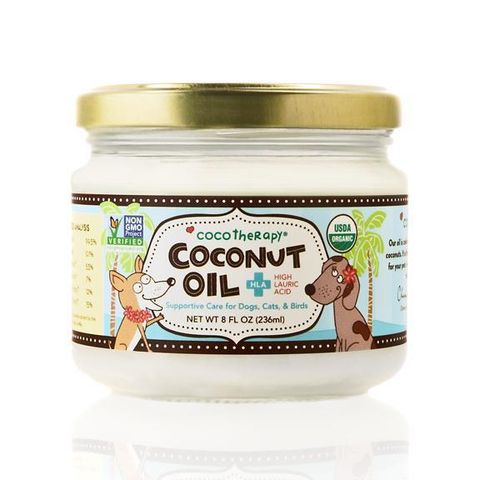
Recommended Article #18January23
Hi, Pet Parents Resources is a platform, where we share with you, what we research as pet parents ourselves. Here, we curate and give, what we hope would be, interesting to important informative articles, videos and even podcasts from our brand creators, experts, researchers, and more all over the world, to aid you in making better choices for your pets.
This recommended article "Is Coconut Oil Safe for Dogs? Does Research Say Stay Away?" is curated and sourced from CocoTherapy. If you loved this article, please do feel free to share it around.
Is Coconut Oil Safe for Dogs? Does Research Say Stay Away?
Does coconut oil do any good for dogs? Itchy skin, yeast infections, canine cognitive dysfunction, even cancer, you have heard them all and thought coconut oil could just be it... Then you were even tempted to give it to your furkid(s), but unsure if it is safe, and it makes it worse that there is conflicting information out there to confuse you further. Well, press on dear friend, you have come to the right place.
Coconut oil has been a controversial fat for a long time, not only for humans, but for pets as well. An online search easily shows one side stating that coconut oil is safe for dogs, while on the other side, it is signposted that coconut oil is unsafe for pets.
Before you become a firm naysayer because you are concerned that coconut oil is unsafe for your canine furkid, read on and take a look at what science has to say about coconut oil, its myths, before making up your mind on how you think and feel about coconut oil.

Myth 1: Coconut Oil is Bad because it is a saturated fat.
It is fact that coconut oil is a saturated fat, however, not all saturated fats are the same. The problem with the above statement is the PRESUMPTION that all saturated fats are the same. There is scientific research to show that the saturated fat in coconut oil is pointedly different from both dairy and beef saturated fatty acids, both of which are long chain fatty acids; while coconut oil is comprised mostly of medium chain fatty acids.
The division and basis of saturated fats are based on the carbon atom numbers in the molecule. The difference in metabolism, absorption and effects on lipid profiles is dependent on the length.
While coconut oil is primarily comprised of saturated fat, the saturated fatty acids (SFAs) in coconut oil are drastically different from those found in other dietary sources. The medium-chain fatty acids like Lauric Acid are very differently absorbed and metabolized as compared to animal fat's long-chain fatty acids. Again, all saturated fats are not created equal.
Dr John Bauer explains in his study, “Facilitative and Functional Fats in Diets of Cats and Dogs”, that while the concept of good and bad fats applies to human health, dogs and cats have the capability to consume saturated fats in their diets without undue risk of coronary artery diseases, heart attacks, or strokes because of their physiological resistance to the hypercholesterolemia, high blood pressure, development; as well as the fact that they have more high density lipids (good cholesterol) than low density lipids (bad cholesterol) to begin with, regardless of the fat type consumed, even when these intake amounts would "typically turn human blood into sludge". This difference is part of the mechanism that protects them from cardiac illnesses. While they may have modest increases in blood cholesterol concentrations, the saturated fats, and possibly trans fats, do not seem to have an effect of increased risk of arterial diseases in dogs, as compared to their human counterparts. In Dr John's opininon, he believes that "it is not advantageous to classify the various types of fats as good or bad in dogs or cats", but rather proposes that dietary fats for our furry friends should be classified as "functional or facilitative, rather than good or bad, respectively".
“Facilitative and Functional Fats in Diets of Cats and Dogs” - Dr. John Bauer, DVM, PhD, DACVN.
Myth 2: Lauric acid is not a medium-chain fatty acid, nor does it act like one when metabolized by the body.
Online research may possibly show that lauric acid, the predominant medium chain fatty acid in coconut oil, as a long chain fatty acid instead. Articles contend that lauric acid follows the same metabolic pathways as long chain fats in animal saturated fats, which in effect would require pancreatic lipase, bile acids, and chylomicron transportation directly into the blood stream; and it is because of this, that there is the claim that lauric acid may cause hyperlipidemia, or pancreatitis in dogs.
What lauric acid IS, otherwise known as dodecanoic acid, is a saturated fat with a twelve carbon atom chain. The body also metabolizes lauric acid as a medium chain fatty acid. Other than human breast milk, which is one of the most abundant sources of lauric acid, the only other abundant natural source is virgin coconut oil, which has an average of 50 percent lauric acid.
A Philippine Journal of Science 2014 study sheds further light on lauric acid's unique properties. Dr. Fabian M. Dayrit alleges that lauric acid (c12) has distinctive properties that are different from longer chain saturated fatty acids based on biochemical and nutritional evidences. The study explains that lauric acid is the make up for approximately half of the fatty acids in coconut oil, while medium chain triglycerides containing lauric acid account for approximately half of all triacylglyceries in coconut oil. These are what allows for Dr Dayrit's conclusion of coconut oil being a medium chain vegetable oil. Dr Dayrit also points out that there is no link between lauric acid and high cholesterol.
It is noteworthy that the American Oil Chemist Society and chemistry databases (ChEBI, PubChem, ChemSpider) all classify lauric acid as a medium chain fatty acid, not only based on its chemical structure, but also its predominant metabolism breakdown. Read more for a detailed explanation on lauric acid being a medium chain fatty acid.
Myth 3: Coconut oil is inflammatory, could cause leaky gut in dogs, or could cause metabolic endotoxemia.
There is a common misconception that coconut oil is inflammatory, causes inflammation, and is not good for dogs. Several articles online question on coconut oil's safety for dogs, claiming that it is best to "just say no" to coconut oil. However, many scientific studies on coconut oil and inflammation prove otherwise. Unlike polyunsaturated fats in vegetable oils, the saturated fats in coconut oil do not have any missing hydrogen atoms or double-bonded carbons. What this means, is that coconut oil is not vulnerable to oxidation and free radical formation, making coconut oil an effective anti-inflammatory fat, and actually protects the body from oxidative stress from free radicals.
There are also studies that evidence that virgin coconut oil has natural anti-inflammatory properties that help heal injuries in the digestive tract and prevent chronic inflammation, and is especially effective at healing injuries in the mucosal lining of your pet's intestine that can lead to leaky gut syndrome. Dr Julie Ann Lee's recommendation, DCH RCSHom, as can be seen from her article on leaky gut in dogs, is to give coconut oil to dogs to supply beneficial medium chain fatty acids. Compared to fish oils, medium chain fatty acids are not only easier to digest, it also reduces the risk of rancidity.
Coconut oil's antibacterial, antiviral and antifungal properties also promote healthy digestion, while the medium chain fatty acids in the oil prevent undue strain on the digestive tract. Furthermore, coconut oil does not cause metabolic endotoxemia, a condition where high levels of endotoxins circulate in the blood. Rather, coconut oil has been shown to kill gram-negative bacteria in the gut and favor beneficial gut bacteria to support gastrointestinal health.
The bottom line - the benefits of coconut oil for dogs is well-known as coconut oil is a unique medium chain saturated fat. Many holistic veterinarians know that coconut oil is a valuable fat for supporting animals who have lipid disorders or are unable to digest fats.
When supplementing your pet's diet with coconut oil, choose a high-quality oil, one such as CocoTherapy Virgin Coconut Oil that contains high levels of medium chain fatty acids such as lauric acid, which are the healthy fats that promote digestive health.
You can purchase CocoTherapy Virgin Coconut Oil from our retailers today!
You may find more interesting reads from JJ E-Homez Holistic Pet today! Look out for loads of information on our product pages, social media, especially our Pet Parent Resources page.
JJ E-Homez Holistic Pet, a Singapore online pet store & distributor that focuses on the holistic well-being of your beloved furkid. Our recommended products aim to support and improve health, emotional and physical well-being, and help your pet have a better quality of life without compromise. Look out for Essential, Trendy and Premium quality pet products that are specially curated, with the pet parents concerns' as a priority.
This blog first appeared on the CocoTherapy website, where this article "Is Coconut Oil Safe for Dogs? Does Research Say Stay Away?" was curated and sourced from.
Original source: https://www.cocotherapy.com/blogs/blog/is-coconut-oil-safe-for-dogs
Thank you for reading! We hope to bring you more informative and exciting articles from other resources and our varying retail brands. Through them, we hope more and more pet parents could become their pet's wellness heroes, proactively taking control of their pets’ foundational health from within, with JJ E-Homez Holistic Pet - www.jjehomez.com.sg 😊
Disclaimer:
JJ E-Homez Holistic Pet has curated and reproduced this article in good faith, which may contain an element of consumer opinion, but cannot be held responsible for any information inaccuracies in it or any use assumed from this information by the reader. JJ E-Homez Holistic Pet welcomes positive recommendations for holistic healthcare products, but does not necessarily endorse the author’s opinion. We acknowledge each animal is an individual and may react differently to the highlighted product/s, and that there may also be other similar effective products available.
General recommendations made by JJ E-Homez Holistic Pet are solely for informational and educational purposes, and are not a substitute for the appropriate veterinary care. It is important to always consult professional help if you have concerns about your furkid’s health.


